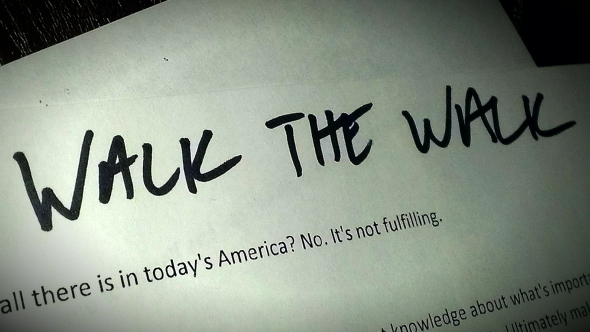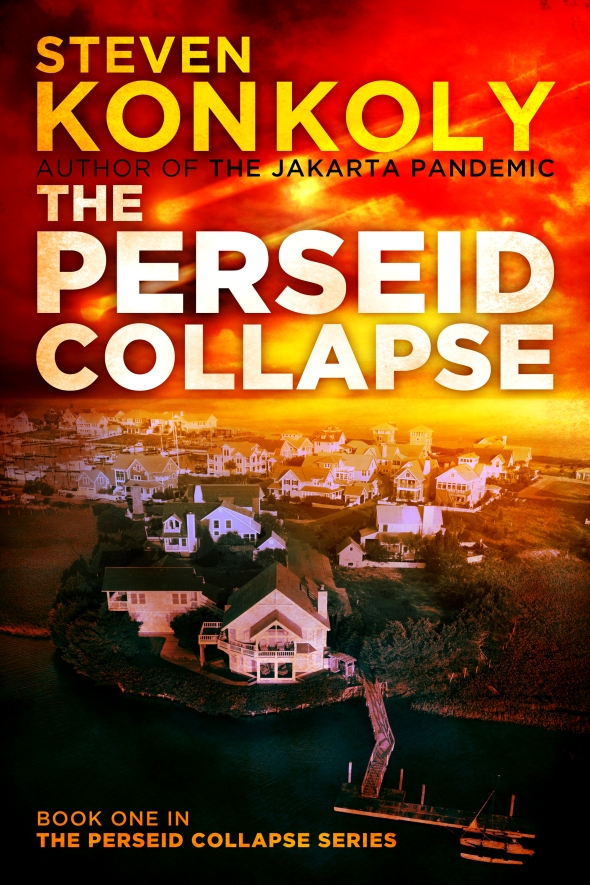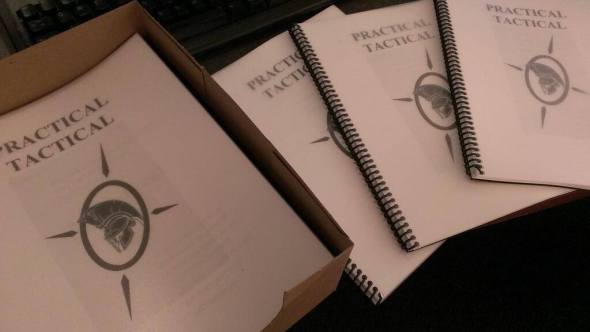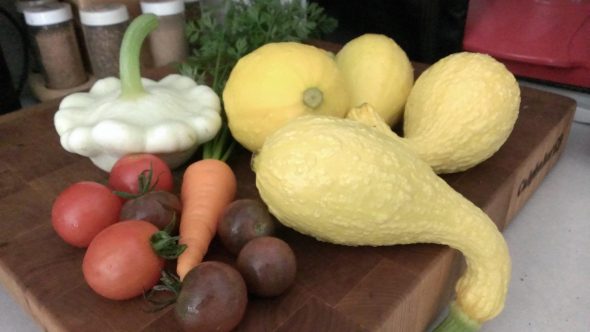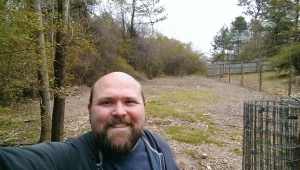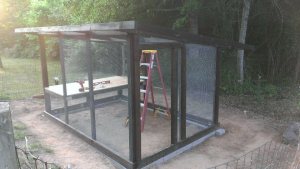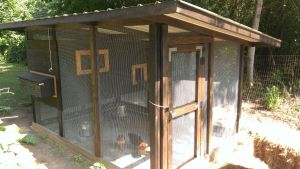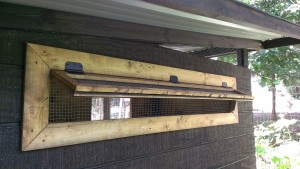Walking the Walk
Despite what you see and hear daily in America, there is more to this life than consumerism, keeping up with our neighbors in the race to collect more stuff and economic growth. In fact, if we are being honest with ourselves, we are forced to admit that a life focused on mindless consumption is rather unfulfilling. Coming to terms with this realization can be daunting, but there are alternatives. You could always choose to throw off the yoke of indentured consumerism in favor of personal freedom and liberty in pursuit of a more productive and rewarding future. This is not the easy option, and it will require more of you than your line of credit, but it is there. The choice is yours.
In our personal lives, my wife Alice and I have chosen to pursue a deeper and richer future. Not necessarily in terms of money, but we have found that we are indeed far better off. In recent years we took a hard look at what’s important to us, the people and the things we value in this life, at what the future may hold and decided to take steps towards making sure that our actions and our beliefs lined up. Our journey has been very satisfying. We are very fortunate that we had the ability to see the fork in the road and have taken the opportunity to walk a divergent path.
It is one thing to pay lip service to preparedness and resilience, but it is another thing entirely to be willing to apply the sweat equity required to make it a reality. We looked around our lives, took stock of things and developed a plan to address the areas where we saw vulnerabilities. Whether it was a hole in our hard asset infrastructure or our emotional and spiritual resilience, we addressed them honestly.
The world we live in is a tempest of swirling uncertainty. Step back from the chaos for a moment. Press pause on the dizzying distractions of our society and take a look around. If you see trouble and hard times on the horizon, why not set yourself against it? You still have time to develop a plan for your family and refocus your efforts to live in a purposeful and meaningful way in concordance with reality.
We are dependent on each other as a society, just as Alice and I are dependent on each other in our personal lives. We are all in this together and the choices we make will impact our future. We are living in a period of change that is impacting every level of our society and how we respond to that change will thunder through the years to come. Building resilience into our lives right now to address our basic needs like energy, water and food supply, takes pressure off of each of us individually, as well as society as a whole. As for the Powers household, we chose to focus on our own deal, create our own story and do what we believe in. I guess you could say we’re doing our best to ‘walk the walk’. Pursuing resilience may have started as a mitigation tool against some possible future that we could see, but it has become clear that it’s a lifestyle we would willingly run to now. We have a great quality of life and have discovered, what is for us, a better way to live. Hopefully our efforts will encourage others to believe in themselves and get started on their road to preparedness and resilience as well.
Semper Paratus!
FRONTIER HOUSE: A WINDOW INTO REAL DEAL HOMESTEADING
Have you ever thought about what life would be like if you lived without all of the conveniences of modern day life? Have you ever considered exactly what would be required of you should you be faced with the reality of having to be completely self sufficient? What if you had to grow all of your own food or build your own house? It doesn’t take long when you’re talking about preparedness to begin to wonder what it would be like to have to survive in a world that’s been thrown back into the 1800s by some catastrophic event like an electromagnetic pulse (EMP) that takes down the power grid, what life might be like after society collapses as a result of the end of the age of cheap oil/energy or following some apocalyptic man-made or natural disaster. I would argue it’s hard to fully comprehend just how difficult it would be for the average American to adjust to this new way of life simply because most people don’t have any idea of the various skills it would take to even begin to be able to sustain themselves. Not only do they not have the appropriate skill set, they don’t even realize what they don’t know. That’s why I wanted to put together this series of educational videos that aired on PBS in 2002, Frontier House, in which modern day families live and survive on an 1883 homestead for five months as they prepare for a Montana winter. Hopefully after watching this series of videos you will have a much better understanding of what life would be like if all of the advantages of 21st century living were stripped away. Enjoy.
Semper Paratus!
Our Current Energy Predicament
This information is not easily found and is certainly not easy to hear, but the reality is that we are in a very precarious energy predicament and the future isn’t looking very bright. However, thanks to the great work of some leading experts on such issues you can become informed. I would urge you to take advantage of the following media and get up yourself up to speed. It could be the mean everything to you and your family in the years to come.
You can find this presentation in PDF form here: Global Oil Market Forecasting: Steven Kopits
And from Gail Tverberg at Our Finite World: Limits to Growth – At our Doorstep, but not recognized (A commentary on the Steven Kopits presentation)
Here are a couple more offerings from Tverberg:
Reaching Limits to Growth: What Should our Response Be?
A Forecast of Our Energy Future; Why Common Solutions Don’t Work
From Dr. Nate Hagens:
And finally, a few words on complexity and the collapse of societies from Dr. Joseph Tainter:
To all of you fantastic members of the PracTac Nation, keep up the good work.
#SemperParatus
The Perseid Collapse : Steven Konkoly : The Interview
We are thrilled to welcome back Steven Konkoly, author of the runaway apocalyptic thriller The Jakarta Pandemic, to discuss the first book of his new project, The Perseid Collapse series. You may remember that we interviewed Steve last year about The Jakarta Pandemic and when we learned that there was a sequel in the works we were very excited and finally the wait is over.
The Fletchers are back in The Perseid Collapse and, I’ve got to say, we’ve missed them. Six years after the the Jakarta pandemic ravaged the life they had known Alex and Kate are pushing ahead into the new reality and are even sending their son Ryan off to college. How about you take it from there and tell us a little bit about the Fletchers and sort of set the stage for what’s going on in The Perseid Collapse?
The Fletchers are trying as much as they can to maintain a normal life. They live in the same home as they did in the first book. I struggled with whether they should stay in that house, whether there was too much bad juju in that neighborhood, a lot went down. They learned that bugging in like they did in The Jakarta Pandemic, although Maine is not as populated as some areas, in a relatively crowded neighborhood in a suburb was not a good idea then and it won’t be a good idea next time because the next time it’s going to be worse. Even if it’s the same or a lesser disaster, it’s going to end up being worse because the memories are fresh. The Fletchers made some money, or retained more money than everyone else, when everything was more or less wiped out after the Jakarta pandemic. So that’s kind of where the novel starts. Their son is on to college, they’re out on their sailboat, which is part of that normal life. They’re not afraid to go out, but they’re cautious. They have preparations. They have BOLT kits. They don’t live like most Americans, but they maintain the appearance that they do.
The Perseid Collapse opens up in China (something I certainly was not expecting) and once again it seems the Red Dragon is impacting the Fletchers world. Can you offer us a little insight into your motivation here?
I think it reflects more of my techno-thriller background that I’ve developed over the last four books in the Black Flagged series. I wanted to give readers a little more. Often times reading other books where you see an America that has been impacted by an EMP (Electro-Magnetic Pulse), there was never an explanation for what happened or even a hint of it….For me, I like to know a little more. So, I set up this international conspiracy based on the Chinese to get them back on the international scene and level things.
One of the things I noticed very early in the book is even though they’re the same people, no one that survived the Jakarta Pandemic escaped without being changed in some way. I noticed it in Kate first, but as the story moved along I saw the same thing in each of core characters and especially in Alex. Everyone seems to have a bit more edge to them and felt a bit grittier. Not in a bad way, but in a real way, and it seems like our group of survivors are more comfortable with themselves and with each other in their reality following the pandemic. Was this intentional and do you want to walk us through your thought process on how each member of the Durham Road group has come through their last six years?
In the first book of the Perseid, everyone has changed. They’ve retained a lot of their characteristics and their core values, but I think realism has really settled in. I thought it was most obvious in Alex, but I agree with you…and a number of other readers have said that they really liked seeing Kate and learning more about her and her mindset. Like you said, early on she establishes herself…not necessarily forcefully…but you know she’s a force to be reckoned with. She was always like that in the beginning. She was always the one that recommended doing the early shooting. She was kind of the more hard core proponent of violence in the first book. Now that’s kind of transferred over to Alex, but you can definitely see that shift.
This story gets downhill in a hurry and just picks up speed from there. A pandemic virus shook things up for the Fletchers last time around, so what is the disaster catalyst that kicks things off in The Perseid Collapse?
When I finally embraced the idea of bringing the Fletcher family (and friends) back for a follow-on series, I knew I had to GO BIG and construct a believable, yet overwhelmingly catastrophic event. The first part of the “event” is natural, something that would have wreaked havoc as a standalone event. Of course, that wasn’t good enough. An opportunistic foe seizes the opportunity to boost the effects of the disaster on the United States.
I’ve got to admit, I love Ed and Charlie. Several times throughout the story, I caught myself laughing out loud in my office in the wee hours of the morning and hoping I hadn’t woken my wife Alice up on the other side of the house. As the story gets started, what can you tell us about how the Walkers and Thorntons are doing?
Ed Walker and Charlie Thornton are like dueling banjos, providing a much needed comedy break at times. Of course, they also play a critical role in the story arch. Both families weathered the years following The Jakarta Pandemic, thanks to the confederation formed by the three families: Walkers, Thorntons and Fletchers. Charlie is his usual self, a little brash, full of conspiracy theories and bristling with gadget laden firearms. His loyalty to Ed and Alex has multiplied exponentially and really plays a major role in The Perseid Collapse. The Walkers remain the cautious and skeptical members of the group, but readers will see that Ed’s changed. With his daughter in the same predicament as Alex’s son…trapped in Boston…he starts to adopt Alex’s “come hell or high water” approach to solving problems.
Without giving too much away, let’s just say that the scenes immediately following the catalyst event were intensely powerful on every level. The stresses of survival just keep coming and we begin to see how once again the Fletcher’s world has changed in a matter of hours. This is also where we begin to see the layers of preparedness that Alex has made sure to build into every aspect of the Fletcher’s lives in the years following the pandemic. There’s so much to discuss here between the gear and their experiences, where would you like to begin?
Alex has definitely shaped their lives on nearly every level, while “trying” to maintain a mostly normal suburban life. Lake property serves the dual purpose of a Bug Out Location (BOL) and pleasant family getaway. BOLT bags (72 hours) taken on trips are modified for outings, in this case, sailing. He’s made some changes to their home situation, staging “grab and go” gear: 72-hour bags, equipment, ammo and food/water, in a room near their garage. This is a nod to some sage prepper advice and a frightening scenario. What if you had to leave your house in five minutes, for an indefinite period of time? Most of us would spend most of those five minutes trying to find a suitable bag to carry the gear you won’t have time to load up. Alex has some other surprises, but we’ll let readers discover these.
Unlike the scenario that played out in The Jakarta Pandemic, this time the Fletchers will not be able to ride out the crisis in the relative comfort and safety of their own home. They, along with their Durham Road cohorts, will be forced to move in The Perseid Collapse. Could you talk about your thought processes in this portion of the story?
The Jakarta Pandemic explored the concept of Bugging In, which if you’re prepared (like the Fletcher’s), can be a comfortable experience—minus all of the neighbors trying to break in to get your stuff and drifters from out of town breaking into houses. For Perseid, I wanted to put the Fletchers on the road. Granted, they have a “bug out location,” and a pretty nice one at that. Once they reach that compound, they’re back to a comfortable living. That wouldn’t be a lot of fun for either of us. There’s only so much trouble you can get into on a 35 mile trip. I knew it had to be harder, and reflect a realistic dilemma. With kids in college, the group would be forced to split up (due to circumstances explained in book) and multitask. Alex leads Ed and Charlie to Boston to recover the kids, while Kate takes the wives and teenage kids on a “bike trip” to their BOL. As a writer, this gives me two storylines to work with, and an opportunity to develop previously sidelined characters.
Obviously, the Fletchers have practiced a lifestyle of preparedness for years and they have been joined by most of the neighborhood in the years since the Jakarta Pandemic. However, the most often overlooked aspect to preparedness is the planning and training, or the “software”, of preparedness that must be in place ahead of the disaster. Without it all of those preparedness goodies that are locked away in the basement won’t do you any good. Ryan (Fletcher) and Chloe (Walker) were both in Boston, albeit different locations, when the disaster strikes. This fact is the reason behind the Durham Road Task Force’s plan to split the group. Without giving too much away too soon, what can you tell us about their situation? Did they have a plan to find each other? If so, did they develop the plans or did their parents figure it all out for them?
Book 2 starts out with a flashback scene that shows the reader Ryan’s experience at the very outset of the “event.” I don’t want to spoil it. You get a teaser in Book 1, but I don’t want to talk about that either, for fear of spoiling Book 1’s end. Sorry. I will say that Alex’s son, Ryan, has definitely paid attention to Alex’s “software” training over the past years.
The gear of preparedness and survival, or the “hardware”, plays a key role in this story. Part of that has to be a result of the lessons learned during the Jakarta Pandemic. Without getting too deep in the weeds, could you talk a little about how you crafted the Durham Clan’s load outs? How and why they chose the items they have chosen for their home stockpiles and for their personal “battle rattle”.
Like the load outs described in your Practical Tactical Handbook, you see a tiered development of their packs. For the Boston rescue strike team, you see two layers. First, they each bring a 72 hour pack, which stays in their vehicle. This is a last ditch, “the car isn’t an option anymore” preparation. They’re travelling over 150 miles away from the family BOL, so the 72 hour BOLT (see Practical Tactical Handbook) kit represents the supplies they need to make it back safely. For the trip into Boston, Alex takes a page from his Marine experience and has them all design an Assault Pack, which is modeled after the Practical Tactical Handbook’s Get Home Bag (GHB). A smaller, off the shelf commercial backpack, this pack is loaded with 24 hours of food and essential gear. For Alex’s group, ammunition and tactical gear replaces some of the items you would find in a civilian Get Home Bag. In Perseid 2, Alex modifies his layer one more time, stripping down to ammunition and communications gear, but you’ll have to dig into the story to learn what kind of a situation might dictate giving up everything but your personal defense and communications equipment.
I found Chapter 17 to be very powerful, a re-setting of the playing board, in a way. We see the Durham Clan as a hardened and determined group that’s forced to make tough decisions and is making them. We also learn that the Walkers and the Thorntons will be joining the Fletchers at the farmhouse, and that brings up an interesting topic. Retreat locations are just that, so how do you decide who you can trust to invite along when the SHTF? In this scenario these families have a history, but we have to imagine that would not be the norm. Do you have any thoughts on how a family that is preparedness minded might approach operational security with regards to a retreat location and who might be considered for invitation?
I’ll keep this one brief. The Fletcher’s have chosen to employ a simple Operational Security tenet to protect their retreat location. Limit knowledge to the few they implicitly trust. The Fletchers trust the Walkers and Thorntons based on previous experience. Their trust has been forged by the fires of conflict, but this can be easily substituted in the real world by common goals and a common commitment to working together…‘A loose federation of like minded families or friends that have demonstrated a willingness to be a part of an equal team.’
Now, we don’t have to spend too much time on it, but let’s get to one of the points I’m most excited about in this story. I know we will learn more about it in the second book in The Perseid Collapse series, but could you talk a little bit about the Fletcher family stronghold that Alex built in the aftermath of the Jakarta Pandemic?
Ah. I have nice map and a bunch of related schematics to help me visualize their compound. (I know Randy is chomping at the bit to learn more about the compound!) Twenty two acres (with about 2.4 acres cleared) on a sizeable pond with no neighbors to the left or right, but a full host of neighbors on the other side of the lake. The land was sold to them after the Jakarta Pandemic, by a family that had intended to preserve the land, but had been financially devastated in the wake of the pandemic. If you remember, the Fletchers invested heavily in gold prior to the pandemic and made out like bandits. They have a main house, barn, and ample garden space. The compound was designed for privacy, even in the winter months. The cleared space sits far enough back from the road to keep passers-by from spotting the house. Of course, they have an entrance road, but that’s constructed too with a minimalist approach. Alex has some surprises installed for security, but those won’t come into play until book 2. Two banks of solar panels (one on the barn, the other on the house) can power the house and barn if the electric is cut. One of the banks of panels is disconnected at all times, to prevent EMP damage, along with a second set of solar inverter/power generation equipment. Alex isn’t messing around.
The most important aspect of the compound, well beyond the gadgets (which are nice), is that the family has spent their time at the retreat divided between enjoyment and making it a livable, SHTF survival location. They all have significant work and effort invested in running the place during the “bearable months,” working in the vast garden and constantly improving the property. Alex’s parents live there year round, which is another significant advantage. The BOL stands ready to receive them 365 days a year.
Speaking of the retreat, the Fletchers built it for a couple of reasons. Clearly it’s called a retreat for a reason, but the location also serves as the new home for Alex parents and his brother’s children, who eventually moved to Maine. Alex parents now care for the children since their parents were both lost to the Jakarta Pandemic. So, someone is living at the location year round. If the Fletchers had to leave their home for some reason, the plan was to go to the Limerick location. That means there had to be a BOLT plan in place. My question regards this plan. There had to be a plan before the disaster, but I’m quite certain it was not for the family to split up or for them to be biking out to Limerick? What was going on in your head as you considered all the possibilities once the story tells us Plan A was out the window?
Even the Fletcher’s aren’t perfect. Like most of us, they’re just as guilty of the “we’ll get to it” mentality. They just dropped their son off at college, so a formal plan had not been developed…though you’ll catch snippets throughout the story that would lead you to believe that this has been rattling around Alex’s head for quite a while.
I mentioned before that we see an evolution to a grittier group of characters in Perseid. I found the interaction between the members of the two travel groups to be fascinating and real. Can you give us a little insight into how you put yourself inside the minds of our travelers and developed the back and forth between the group members during their journeys, including the emergence of some characters we might not expect?
In my experience, hardship forges the deepest bonds of friendship. The Marines (and I’m sure many other military units) had a saying, “the hotter the fire, the tougher the steel,” which captures the essence of this phenomenon. In The Perseid Collapse, Alex’s group has worked together before, well outside of the comfort zones, so they share a strong bond. They have vastly different personalities, which cause friction, but overall they know what to expect from each other…until now. The stakes are higher and the danger is more immediate in PC, so this dynamic is challenged right from the beginning. Alex and Ed have the exact same goals, reach Boston and rescue their children, but they approach the trek differently, based on their personalities and experiences. Alex is confident about his skills and cautious about the bigger picture. Meanwhile, Ed is impatient to reach Boston, but resistant to Alex’s more immediate solutions to their problems. I set out to show how these conflicts and differences can wear on the best of friends in a stressful situation. You’ll feel the tension between them as the challenges mount, almost to a painful level.
Kate’s group is a different story. The friendship between the women and teenagers is less defined in the beginning, but starts to solidify as their separate journey unfolds. Book One in the series spends more time following Alex, but the building blocks for the women’s tale are assembled, and the reader will see how their friendship grows tighter as the fires of the forge grow hotter. Book Two will showcase their newly forged bonds as they work together to defend their families from a sudden, unexpected threat.
Like much of the population that they will encounter along the way, the Durham Road families learned hard lessons during The Jakarta Pandemic. Gritty is a perfect description. You don’t want to get in their way…with bad intentions. In The Perseid Collapse’s post-apocalyptic world, any of the characters can fill the role of “Judge, jury and executioner” within the blink of an eye. Despite Alex’s more “Road Warrior” like tendencies in TPC, you’ll catch glimpses of the old Alex in the series. I just wrote a scene in book two that defines Alex. It’s a snap situation leaving him seconds to make a difficult choice. I had goose bumps writing it. It’s the ultimate, “What would you do?” situation.
With our groups being forced to relocate from Durham Road, it is clear they will be coming into contact with more people than the random refugees (even though they were a threat) encountered during the Jakarta Pandemic and that increases the opportunity for danger. These threats can come from individuals or from groups that band together like wolves after a disaster. If you can, give us your view of the civil unrest and the change in threat assessment that would certainly follow the catalyst event in Perseid?
I don’t believe it’s going to be the mutant, biker zombie gangs you see in some of the literature. Although, it’s not that crazy because you have the large groups out there and I’m not just talking about bikers. What’s to say that any kind of group that gathers and is close like an Eagles Organization, and some groups are closer than others, would not come together in a situation like this. I belong to Scarborough Fish and Game. It’s a shooting range where you shoot skeet and do all sorts things like archery. It’s a really nice place. I’ve always sort of envisioned that if something like this happened, I would imagine there’s a pretty tight group over there. Come something like this that clubhouse is going to start filling up with people with the same mindset and, for good or for bad, they would work together (probably for good because everyone over there is really awesome and really down to earth). But I’m thinking, where is the opposite group? Where are the people who are close that aren’t so good? Those people are the ones you’re going to have to watch out for because they’ll form gangs, they’ll form organized groups and it’s kind of like that ‘reign of terror’ thing.
There has been a lot of talk about militia groups in the preparedness world for years. We see both sides of the militia movement in this book, the good and the bad. What should we look out for as we discover how they fit into this story after the disaster?
My wife told me at the very beginning, “Whatever you do, don’t piss off the militia groups. There will be no bug out location we can hide because they’re already hiding in them.” In all fairness, the one militia group is kind of more of a gang. It doesn’t fit the standard definition. So, that’s what you’ll see. This guy that’s in charge of that, he’s clearly demonstrates himself to be psychotic and to have an agenda. He’s going to be a very charismatic character in book two and he already is kind of now, very good at manipulating a situation right on the spot. He’s got half of southern Maine believing that there is a special forces unit running amuck and he’s got a plan.
There are a number of militias here and I contacted one of the more, well established ones…and I tried to interview this guy and he clearly wasn’t biting. He’s an older gent, extremely suspicious. I tried explaining what I was doing and it was going nowhere. So I sent them an email and read a couple of articles describing their philosophies, and he described them as being kind of a back up to the National Guard. Informally, that’s how they view themselves. I liked that idea and I liked the concept and wanted to make it something a little more organized in the book. There’s a history. They used to fit the mold of what most American’s think of when you think of militia groups and I kind of wanted to show that that’s not the case, because it really isn’t. There are groups that are taking down abandoned buildings every weekend, they do that. That’s what there doing. They’re training themselves as a counter government force or whatever it is, but I think a lot of them, that’s not where their core and heart lies. So, I kind of want to mimic what I learned from him, but like I said they never got back in touch with me. They probably think I’m going to write a nasty, horrible book about them. Little do they know that I made the leader and the group a good group, they’re good guys and they’re out to help and diffuse the situation with that other group and that’s going to be coming into big play in book two and three.
Alex is going to learn a lot in book two from his interactions in Boston, his eyes are going to be opened to some wrongs and rights that are being done by the Marines, by these other groups. I allude to these criminal elements that are running amuck. Just to give you a hint, they’re not criminal elements. The criminal elements were there and they’re gone now and there’s a reason they’re gone. There’s a lot of misunderstanding, one group shooting at the other. The Marines are holding the bridges and no one knows how they got there within 24 hours. So, things that he sees in there will be shaped and that will help him in a major task and endeavor when he’s back in Maine. So, there’s a little foreshadowing while staying about as nebulous as I can get without giving anything away. I wanted to give the duality. Not to say that there are some horrible militia groups that are just murderous, that’s not the goal. I didn’t want that impression (that all militia are bad).
The finish to book one is thrilling to say the least and the final sentence is absolutely chilling. I know you’re currently working on book two in The Perseid Collapse series, so what can we look forward to in the next book? Do you have any teasers for us?
It will pick up with a flashback and then the story will pick right back up with Alex after he makes that statement and there’s more interaction with the students. He’s not just sliding out of the window on his way out of there. More occurs there. More stuff that kind of shapes how he’s thinking and shows his character. Kind of that character that he’s developed where he’s just not going to put up with the little guys being beat up. Like when he discovers the people being dragged off into the woods and all that. He’s kind of a little bit on a retribution…he’s a lot more about proactively doing the right thing as in taking it into his own hands and you’ll definitely see that in his interaction with the kids. I tell you, I’m having a blast writing it.
My goal is the story always. It’s kind of my worst case scenario, having a child away at college. It was hard to write that. When I’m writing I’m kind of in like a ‘just get the story down’ mind set. It’s when I stop and kind of really ruminate and think about the scenario that they’re in…I’m doing that, but…like that line, like you said, the ending line…it was just so natural to write that because it literally just hit me.
There’s no one coming.
I looked at the numbers and the incoming freshman class at Boston University is 20,000. You’ve got to figure maybe 5% of them, maybe, live within a reasonable walking, as in days, walking distance. You’ve got Maine, Massachusetts…New England is compact which is good…maybe give it 10% that could throw a couple water bottles together, grab a couple packs of Doritos and set out on their own and they may or may not make it back. They have that option, but there’s a lot that don’t. They don’t have an option even close to that. Like I said, I think the default would be to sit and wait. To think about parents, it’s powerful stuff. It really made me think. It kind of stopped me in my tracks reading it, you know writing it and reading it, I didn’t know it was coming.
I kind of in my mind, I had Alex going in there in a very business like manner. Shoot the door down, kick it in…son’s not here…I’m out of here. But I’m like, I can’t do that. These kids are all here. These are ALL HIS kids. He’s all amped up coming up, but when it all settles he looks at the picture (of Ryan) and it kind of all hits him. It just kind of came. That’s how writing works, stuff like that. I didn’t have a yellow sticky that said ‘Alex feels sorry for the students’ it just kind of happens. Stuff happens like that, I think, in writing. I would almost guarantee that 90% of the best parts I would consider being in the book are things that I did not write down or have planned ahead. They just kind of, they’re just part of the story.
Well Steve, you’ve certainly managed to pull us right to the edge of our seats with this book and have left us there as we wait for Book 2 in the series, The Perseid Collapse: Event Horizon. It sounds like we’re in for a wild ride the rest of the way and you’re right, I absolutely can’t wait to hear more about the Fletcher Compound!
On a personal note, I would like to thank you for giving us a chance to work with you and consult on this project. This past year has proven to be educational, exhilarating and a ton of fun and we look forward to an exciting ride as The Perseid Collapse series unfolds.
Remember everyone, you can reach Steve Konkoly via email at stevenkonkoly@gmail.com and be sure to check out his blog, http://www.stevenkonkoly.com, where you can get a window into his world, find book reviews (apocalyptic, thriller, horror and some sci-fi) and keep up to date about his future projects. There’s something for everyone.
Finally, I want to encourage everyone to join in and keep the conversation going by asking your own questions of Steve (or me) in the comment section below and by sharing this talk on Facebook and Twitter (or your preferred social media platform) with everyone you know. Works like The Perseid Collapse force us to think and ask ourselves the pressing question, “Am I prepared for a major disaster or emergency situation?” The more people we can reach and hopefully help along their journey towards personal preparedness the better off we’ll all be in the long run.
#SemperParatus
Electromagnetic Pulse (EMP) Wake Up Call
Electromagnetic Pulse. EMP.
Do you know what it is? Do you know how it could impact you? Why should you care?
All of these questions and more are answered in this wonderful video that features a brilliant panel of experts on the subject that could bring about the end of the world as we know it (TEOTWAWKI). This 53 minute video could change your life. It is worth the time. Watch it. Your life, or the life of someone you love, could some day depend on what you will learn in it.
Semper Paratus!
Resilience Infrastructure
Although we have been practicing preparedness for several years now with an eye towards becoming more resilient in our every day lives overall, 2013 has proven to be a quite an interesting year around the homestead. Even though we have long been the outdoor types that enjoy all that this old world has to offer, when the year started one of our new year’s resolutions was to spend even more time outside. We quickly decided to take that notion one step further figuring that if we were going to outside more anyway, we may as well spend that time in various productive pursuits. The following are a few of the projects we’ve upgraded or completed over the last twelve months.
Growing Our Own Food

Full disclosure, we started our vegetable garden back in the spring of 2011, but if you know anything about gardening at all you understand that you never have the same garden from year to year whether you’re responsible for changing anything or not. Climate, pests, the size of your garden, what you choose to grow, your garden’s soil and any number of other things can and most likely will impact your gardening experience from year to year. With that said, we chose to expand the size of our backyard garden plot by making it about eight feet wider and six foot deeper with the final size measuring 28 feet x 24 feet. In addition to growing in size, we also decided to try several new crops this year including both red and sweet potatoes as well as experimenting with raised garden beds and container gardening for the first time. We also really ramped up our understanding and development of the composting process and have seen some decent results. Overall, our three years have been very successful and we are learning more each time we break the ground.
Rain Water Catchment System
Living in Georgia, we are no strangers to long hot summers and varying levels of drought. So, once we had the garden in place we decided to build our own rain water catchment system to employ as our main source of irrigation. I found a good deal on a couple of 250 gallon food grade containers with ball valves and after a quick visit to our local big box home improvement store, we had rigged up a very efficient and effective method to capture and hold up to 500 gallons of fresh rain water. My wife Alice built a gravity fed watering system that runs from the holding containers to the vegetable plot and we use that system daily to water the garden. This set up also adds resilience to our household in that it can serve as a source of fresh water for drinking, cooking and hygiene should the need ever arise.
Mini Orchard

Once we saw how much success we were having growing our own food (more than the two of us can eat in most cases), we decided to add to that by turning some of our previously unused space beyond the original fence line into a mini-orchard of fruit trees. We invested the labor and sweat equity ourselves, felling trees and clearing brush, and cleared a space measuring 66 feet by 25 feet. We now have six fruit trees, three apple and three peach in dwarf varieties and we hope to add a cherry tree or two this year if possible. Another happy byproduct of our efforts was a large supply of wood that we cut up into workable pieces that was divided into firewood and lumber that we are going to use to build a Cold Frame to protect our small plants like a mini-greenhouse, as well as more raised garden beds.
More Fruity Goodness
Around this time, we had a friend offer us several small blueberry bushes that they had harvested from their older plants. Seeing no reason to not continue to maximize our space by planting delicious eats, we moved back inside what was the back fence line and planted a long row of blueberry bushes from one side of the yard to the other. They all seem to be doing rather well and we look forward to seeing if they really “jump” this spring.
Bountiful Times
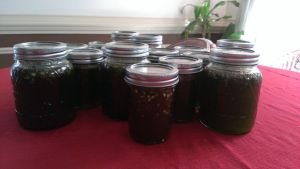
As I mentioned before, we have been very successful with our vegetable garden since we started it three years ago. The very happy result of that success has been an abundance of fresh produce, so we decided to meet this scrumptious challenge and get up to speed on all the various ways to preserve our harvests through canning and pickling. We have learned a lot, gotten a good handle the basics and are trying new things all the time. Our various pepper jellies have even become the stuff of local legend and rather high demand around these parts. :o) We also have plans to build a solar dehydrator in the next month or so to begin drying more of our garden goodies.
Rock Stars!
About the time we were finishing up the orchard project, we finally made up our minds that the time was right to get ourselves some chickens and crank up the egg production. We settled on five hens…a White Rock, two Easter Eggers, a Rhode Island Red and a Golden Buff.
Now if we were going to do this thing, we certainly weren’t going to be boring about it. We had been thinking about making this move for some time and had given it a lot of thought, so we had a really vivid image of what we wanted the coop to look like. This would be no run of the mill coop with some basic unstained lumber and a little chicken wire. We intended to build a really strong and attractive coop that would look more like a backyard play set or clubhouse than a chicken coop. Once we got our hens and we began to see their personalities develop and get an idea of what they might look like as they grew older, we decided to name them. We’re huge music fans, the Blues in particular, and that proved to be our inspiration when it came time to name our ladies. That process shook out as follows…Meg, the White Rock, because…Meg White…I mean, come on; Aretha (Franklin) and Koko (Taylor) are the two Easter Eggers; Bonnie, the Rhode Island Red, in honor of Bonnie Raitt; and Pink, the Golden Buff, after her namesake’s brilliantly bleached golden-white locks.
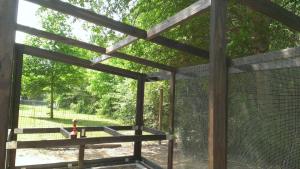
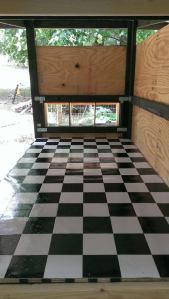
The next evolution of ideas in this process led us back to the coop. If it was going to house such a group of rock stars, it would have to be fitting of such guests both in appearance and style. So, we proceeded to build what we have come to affectionately call The Rock and Roll Hen Palace. It comes complete with designer window shutters, a gravity fed nipple watering system, a drawstring controlled door to the hutch and even a dance floor!
We believe that happy chickens are healthier, lay more often and produce very tasty eggs. Our ladies are free range, we let them out of the coop every morning and close them in every night once they go to roost, and they get only the best when it comes to feed. Even though we named our hens after rock stars, they are actually living up to the title and have been fantastic egg producers for us. We have come to REALLY enjoy and care about our ladies and we cannot see a future in which we do not have chickens and fresh eggs on the counter.
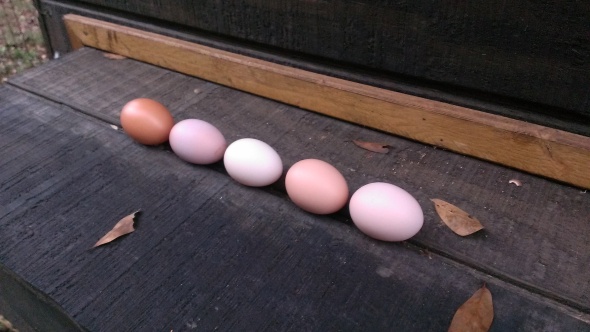
Bread Making
Another challenge I have long considered taking up that finally made its way off my board and onto the grind stone this year is making my own bread. “Hello. My name is Mr. Powers and I’m a carb-o-holic.” They say admitting you have a problem is the first step, you know. Well, I have no intentions of giving up this addiction. This summer I jumped into bread making with a no-knead option that turned out extremely well and I’m just getting started. I am really looking forward to trying all sorts of new breads going forward.

So, there you have it. This past year has proven to be extremely productive for us and we’ve certainly gotten a lot accomplished, learned a ton and have had a blast along the way. The best part is that everything we have done was not done just for the sake of doing. Relentlessly practical in their own right…food, water, fitness (both physical and mental), skill building…each project we improved on or completed in 2013 was based in our desire to become more resilient in all facets of our daily lives. We are aggressively turning the land we have from some thing that we just make payments on and trim up to keep the neighbors happy into a living, breathing asset that is working for us, 24 hours a day to help provide for our most essential needs. What’s more, the positive psychological impacts of our efforts are immeasurable. The entire process has been extremely rewarding for us both and we look forward to bigger and better things going forward. We believe that we have developed a solid foundation in our resilience infrastructure that will serve us very well in the future, even as it continues to grow and expand with each new challenge we decide to accept.
Semper Paratus!

